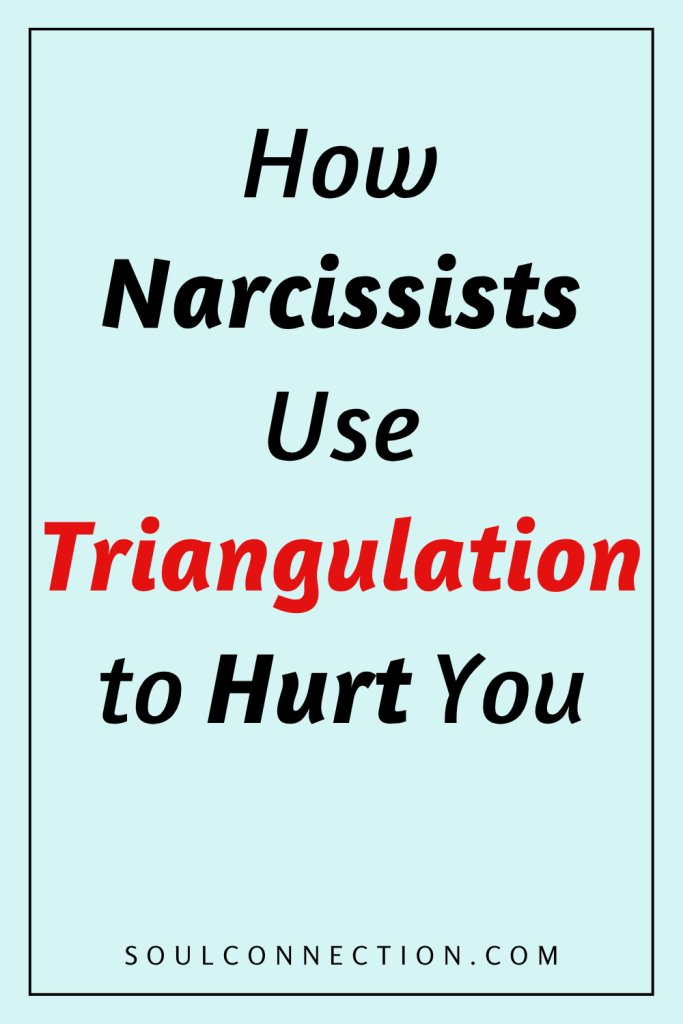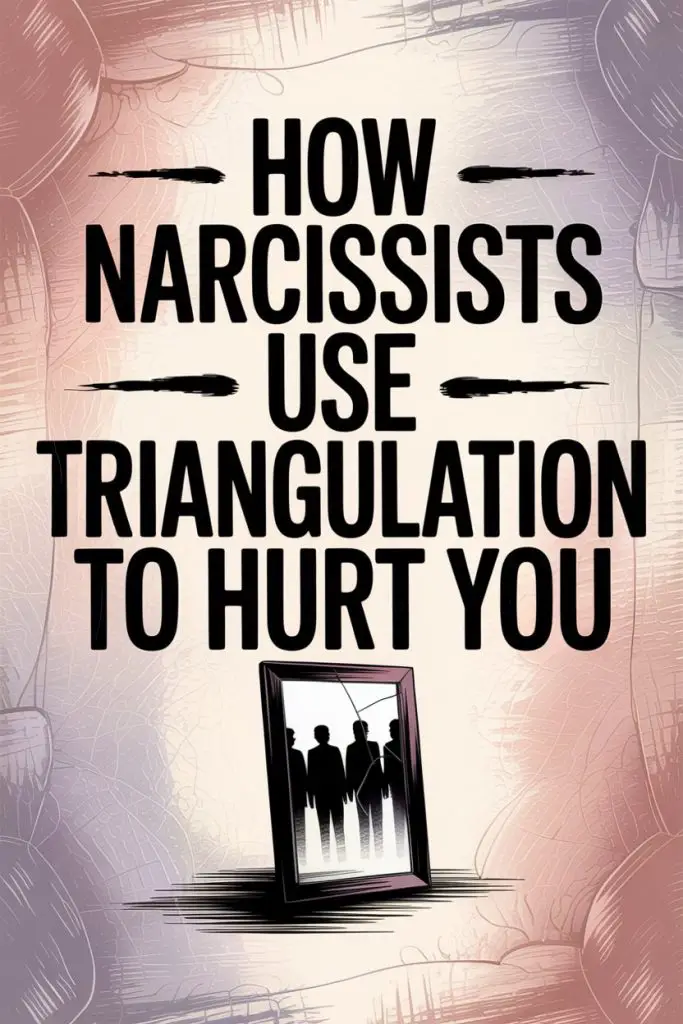Ever feel like you’re starring in a soap opera you didn’t audition for?
Some relationships have a knack for drama, especially the ones with a narcissist in the cast. One of their favorite plot twists?
Triangulation. No, it’s not a fancy geometry term or a yoga pose—though you might wish it was.
Time to unravel the mind games and see exactly how this tactic works, why it stings so much, and what you can do to step out of the chaos.
What on Earth Is Triangulation Anyway?
Imagine you’re having a perfectly everyday disagreement with your partner.
Suddenly, out of nowhere, they drop some version of: “Well, my friend Jamie says I shouldn’t put up with this.” Or, “Even your mother thinks you’re being unreasonable.” Congratulations, you’ve just been triangulated.
Triangulation is when a narcissist drags a third person, opinion, or reference into your interactions. This creates a triangle of confusion, with you firmly wedged into one corner.
The goal? To destabilize, control, and keep you spinning.
Why Narcissists Love Triangulation
Control is the name of the game. A narcissist craves power, validation, and—let’s be honest—a bit of chaos.
When they loop in a third party, it’s not about clarity. It’s about seeing you squirm, compete, or doubt yourself.
Triangulation turns the narcissist into the puppet master, yanking strings from above while you and the other person (or just the idea of them) dance around, unsure what’s actually real.
The Many Faces of Triangulation
Don’t expect a narcissist to stick to one flavor of chaos.
Sometimes they’ll pit you against an ex, comparing you at every turn. Other times, it’s a family member: “My mum never had a problem with the way I do things.” Sometimes, they’ll invoke a mysterious friend, a therapist, or even their kids.
And let’s not forget the “silent triangle,” where they suddenly go cold on you and give all their attention to someone else—just to make you wonder what you did wrong.
Why It Hurts So Much
Triangulation attacks your confidence like a moth in a cashmere drawer.
Suddenly, you’re questioning yourself. Are you really being too sensitive? Is everyone else secretly annoyed by you? The narcissist’s third-party references feel like a Greek chorus chanting your flaws.
Rational debate flies out the window, replaced by a frantic need to win back favor or prove your worth.
Spoiler: That’s exactly where the narcissist wants you.
Classic Triangulation Moves
Grab your popcorn. Here’s how these plot lines usually unfold:
- Comparison Olympics
“My ex never made such a big deal about this.” Translation: Try harder, or else. - Anonymous Critics
“Everyone thinks you’re overreacting.” Who is everyone? The narcissist’s imaginary fan club. - Jealousy Spark
Flirting with others in front of you, then acting like you’re nuts for being upset. - Family Drama
Whispering to your siblings or parents about your “problems” before telling you you’re too sensitive. - The Sudden Cold Shoulder
Showering attention elsewhere and acting like it’s your fault for not being “fun anymore.”
If you feel like you’re in a perpetual competition for affection or approval, that’s triangulation at work.
The Emotional Fallout
This isn’t just a bit of harmless drama.
Triangulation can make you feel insecure, isolated, and desperate to please. It erodes trust—not just in your partner, but in your own instincts. Relationships become exhausting obstacle courses.
Often, friends and family get pulled in, polarizing your support system. You end up defending yourself, explaining, and apologizing for things you don’t fully understand.
Sound familiar? It’s not you. It’s the twisted game.
Why Triangulation Works So Well
Narcissists have a sixth sense for emotional vulnerabilities. Triangulation feeds on your need for connection and approval.
By introducing a third party, they keep you off balance. Every time you think you’ve sorted things out, another opinion, rumor, or comparison throws you back to square one.
It’s a way to keep you guessing, clamoring, and—most importantly—under their control.
How to Recognize the Signs (Without Losing Your Mind)
Keep an eye out for these classic symptoms of triangulation:
- Conversations frequently reference other people’s opinions about you.
- The narcissist’s attention swings between you and another person like a broken see-saw.
- You feel a growing sense of competition, jealousy, or insecurity.
- Disagreements keep ending with: “Even X thinks you’re wrong.”
- Suddenly, you’re the only one being stonewalled or left out.
If you notice these patterns, the triangle isn’t in your imagination.
Why Arguing About It Doesn’t Work
Telling a narcissist you see the game they’re playing is a bit like announcing you know how a magician did the trick—except the narcissist just pulls a rabbit out of another hat.
Triangulation thrives in murky conversations. Pointing it out usually earns you a fresh round of blame-shifting, gaslighting, or—ironically—more triangulation.
Exhausting, isn’t it?
How to Break the Triangle
Escaping the narcissist’s triangle doesn’t require a PhD in conflict resolution, but it does take a bit of backbone and a dash of strategic indifference.
Refuse to Compete
Stop jumping through hoops. If your partner starts comparing, deflect politely: “I’m not interested in competing with your ex/friend/mum.”
Set Your Boundaries
Make it clear you won’t discuss your relationship with outsiders unless you both agree. If someone else is being drawn in, step out of the conversation: “I’d rather keep this between us.”
Don’t Chase the Narcissist’s Approval
Remind yourself: Their validation isn’t the prize. Reclaim your self-worth.
Limit Your Emotional Investment
Notice when you’re getting pulled into pointless rivalry or drama. Ask yourself, “Is this really about me, or about the narcissist needing to stir the pot?”
Connect with Trusted Support
Build a circle of friends or a therapist who can remind you what sanity looks like. Make sure these people have YOUR interests at heart—not the narcissist’s version of events.
Handling Third Parties
Triangulation often puts innocent bystanders in awkward spots. Sometimes your mate tells their mum you’re impossible, or involves friends in stories about what a “challenge” you are.
If you feel comfortable, reach out directly but calmly: “Hey, I heard my partner mentioned something about us. Would you mind letting me know what was said? I want to sort things out myself.”
Keep it neutral. Avoid accusations or drama. The goal isn’t to win people over, but to gently disrupt the triangle.
If the third party isn’t trustworthy or just loves a bit of scandal, keep your distance and focus on your own boundaries.
When to Get Help
Triangulation may sound like a clever (if infuriating) social tactic, but it can have real psychological costs. Anxiety, depression, and self-doubt are common side effects.
If you’re feeling overwhelmed, reach out to a counselor or support group. Sometimes, the healthiest choice is to take a giant step back from the relationship altogether.
No relationship, no matter how charming the narcissist, is worth sacrificing your sanity.
Reclaiming Your Spot in Your Own Story
Getting pulled into a narcissist’s triangle feels like being typecast in a never-ending melodrama. The good news? You can walk off set.
Recognizing triangulation for what it is—a manipulation tactic, not a reflection of your worth—is the first step toward emotional freedom.
Call out the pattern (to yourself, or to a trusted ally), set boundaries, and keep your self-respect on speed dial.
No triangles required. Just the simple geometry of two people figuring out life together—minus the extra sideshows.


